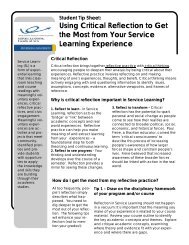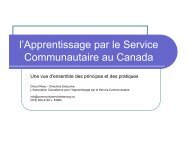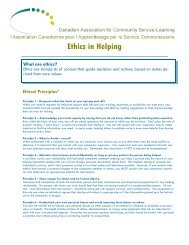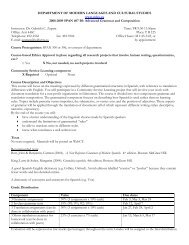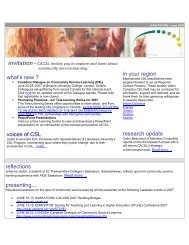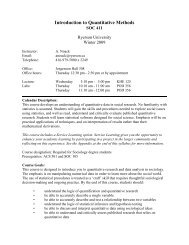MLCS 210 Language(s) of Culture - The Canadian Alliance for ...
MLCS 210 Language(s) of Culture - The Canadian Alliance for ...
MLCS 210 Language(s) of Culture - The Canadian Alliance for ...
Create successful ePaper yourself
Turn your PDF publications into a flip-book with our unique Google optimized e-Paper software.
elate theories and concepts <strong>of</strong> collective identity, otherness, or minority to their studies <strong>of</strong><br />
different languages and cultures, as well as to their daily experience <strong>of</strong> culture in a multicultural<br />
society and within the international scene.<br />
Further goals <strong>of</strong> the course are:<br />
- to increase the identification and recognition <strong>of</strong> what culture is.<br />
- to introduce different cultures and processes <strong>of</strong> cultural shaping and interaction.<br />
- to make students aware <strong>of</strong> how different cultures are manifested in our community, as well as<br />
how culture and cultural phenomena directly impact daily life.<br />
Texts:<br />
Course Textbook and Materials:<br />
Required (available at U <strong>of</strong> A bookstore):<br />
Lustig, Myron W., and Koester, Jolene, Intercultural Competence: Interpersonal Communication<br />
Across <strong>Culture</strong>s. 5 th ed. Boston: Allyn and Bacon, 2006.<br />
Recommended:<br />
Since you will produce written work throughout the course, and will be required to provide<br />
complete bibliographic in<strong>for</strong>mation <strong>for</strong> all assignments, it is necessary that you use a correct and<br />
consistent citation style. I highly recommend the MLA citation style, an explanation <strong>of</strong> which can<br />
be found in a writing guide, such as Hacker, Diana, A <strong>Canadian</strong> Writer’s Reference. 3 rd ed.<br />
Boston: Bed<strong>for</strong>ds/St. Martin’s, 2004.<br />
Supplementary reading and research<br />
(available at Library “on reserve” or contact the instructor):<br />
Lustig, Myron W., and Koester, Jolene (Eds.), AmongUS: Essays on Identity, Belonging, and<br />
Intercultural Competence. 2 nd ed. Boston: Allyn and Bacon, 2006.<br />
Gannon, Martin J., Understanding Global <strong>Culture</strong>s. Metaphorical Journeys Through 23 Nations.<br />
2 nd ed. London: Thousand Oaks, 2000 (or any <strong>of</strong> the following editions).<br />
Sardar, Ziauddin, Loon, Boris Van: Introducing Cultural Studies. Thriplow, Royston: Icon<br />
Books, 2003.<br />
Jandt, Fred E. (Ed.), Intercultural Communication. A Global Reader. London: Thousand Oaks,<br />
2004.<br />
Holliday, Adrian, Hyde Martin, and Kullman, John, Intercultural Communication. An Advanced<br />
Resource Book. London, NY: Routledge, 2004.<br />
Kiesling, Scott F., Bratt Paultson, Christina (Eds.), Intercultural Discourse and Communication.<br />
<strong>The</strong> Essential Readings. Ox<strong>for</strong>d: Blackwell, 2005.<br />
Macfadyen, Leah P. and Roche, Jörg, Communicating across <strong>Culture</strong>s in Cyberspace.<br />
A Bibliographical Review <strong>of</strong> Intercultural Communication Online. New Brunswick:<br />
Transaction, 2004.<br />
2




